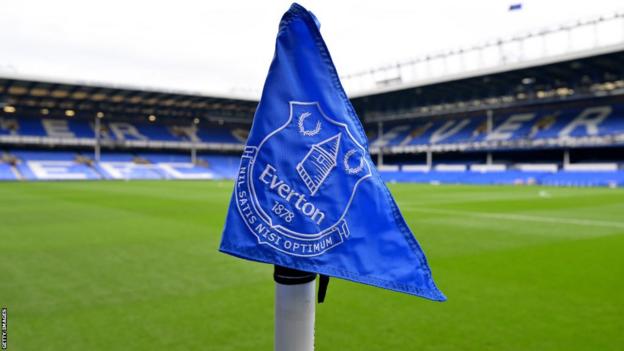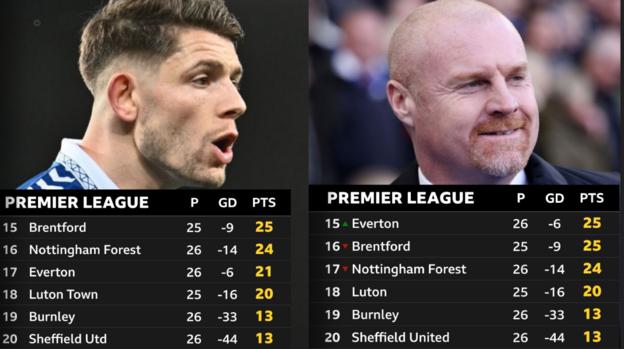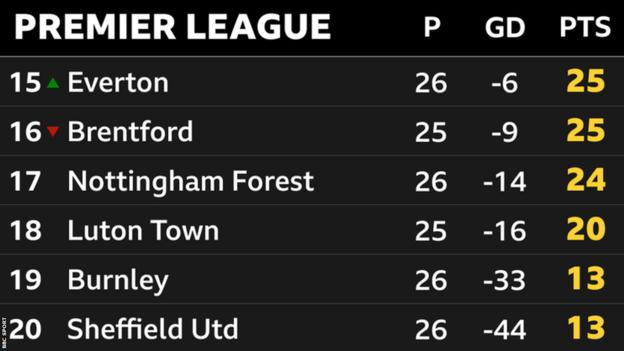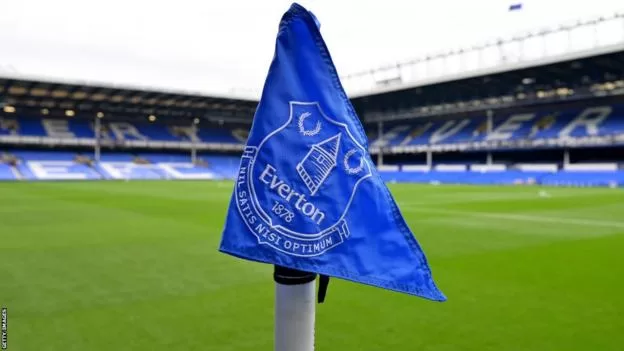
Everton’s punishment for breaching Premier League financial rules has been reduced from 10 points to six after an appeal.
The club were immediately docked 10 points in November for breaching profit and sustainability rules (PSR) in the three-year period to 2021-22.
The punishment – the biggest in Premier League history – took Everton from 14th to 19th in the table.
The reduction in the ban lifts them from 17th to 15th.
Everton, who admitted the breach, said they are “satisfied” with the reduction.
They are facing another possible points deduction after being charged in January with breaching rules for a second time, for the three seasons up to 2022-23, which must be heard by 8 April.

A Premier League statement read: “Everton FC appealed the sanction imposed against it on nine grounds, each of which related to the sanction rather than the fact of the breach.”
A three-person appeal board concluded that the independent commission which imposed the 10-point ban “made legal errors” on two grounds.
It said the commission was “wrong” to punish Everton for being “less than frank” over what it told the Premier League about its new stadium debt.
The appeal board also said the commission was “wrong not to take into account available benchmarks” and that a six-point sanction was “broadly in line” with English Football League guidelines.
Everton said the appeal board’s decision to overturn the commission’s finding that they failed to act in good faith was “an incredibly important point of principle”.
The outstanding charge against Everton could not be heard until their appeal against the 10-point deduction was competed.
Everton say they remain “fully committed to co-operating” with the Premier League over the second charge.
Everton, who have not won in the league win since 16 December, are now five points clear of the relegation zone with 12 games remaining.

How did we get here?
PSR, aimed at promoting financial stability among clubs, were introduced in 2015-16.
English top-flight clubs are permitted to lose a maximum of £105m in a three-year spell, or £35m per season, but Everton recorded losses of £125m over three years.
The Premier League referred Everton to an independent commission in March 2023, a month during which they posted financial losses for the fifth successive year after reporting a £44.7m deficit in 2021-22.
The commission said Everton’s issues were overspending – largely on new players – an inability to sell players and a lower than expected 16th-place finish in 2021-22, which caused a loss of expected income of about £21m.
Thousands of Everton fans held anti-Premier League protests following the original deduction, while a several regional politicians raised concerns, including Mayor of Liverpool Steve Rotheram and Mayor for Greater Manchester Andy Burnham.
Everton manager Sean Dyche said on Friday that the wait for a verdict may have had a psychological effect on his players because of the uncertainty surrounding their league position.
What did the appeal panel say?
The initial commission said Everton were “less than frank” in relation to what they told the Premier League about their new stadium debt as development continues for the move from Goodison Park to Bramley Moore Dock late next year.
The initial charges said Everton breached Premier League rule B15, which imposes an obligation of “utmost good faith”.
However, the appeal board said: “Whilst the representations made by the club about the stadium debt were materially wrong, it was not the Premier League’s case that that was anything other than an innocent mistake.
“These errors were material, in that they affected approach and conclusion of the commission in relation to sanction.”
Everton said the appeal board’s decision to overturn the commission’s finding that they failed to act in good faith was “an incredibly important point of principle”.
The appeal panel also said the six-point reduction was “not out of kilter with any other available benchmark, including those under the Premier League rules themselves (such as the automatic sanction for insolvency of nine points)”.
What happens next?
The second Everton charge for alleged breaches in the three-year period to the end of 2022-23 must be heard by 8 April, by which time only six rounds of league fixtures will remain this season.
In September owner Farhad Moshiri agreed to sell his 94% stake in Everton to American investment fund 777 Partners.
The takeover has been cleared by the Financial Conduct Authority (FCA) and the Football Association (FA), but Everton are still awaiting Premier League approval.
Nottingham Forest and Manchester City are the only other clubs to have been charged by the Premier League for financial breaches.
Treble winners Manchester City were referred to an independent commission in February 2023 over more than 100 alleged breaches between 2009 and 2018. Cases for both clubs remain ongoing.
Analysis – Dan Roan, BBC sport editor
This might be Everton’s biggest result of the season so far. They will be relieved that their punishment has been reduced, and will feel vindicated after describing the original 10-point deduction as excessive. Significantly, the appeal board found that the commission had made “legal errors” on two grounds – including that the club failed to act in utmost good faith. That finding – and the regained four points – will be a source of considerable satisfaction among their fans, many of whom were furious with the Premier League over what they saw as an unfair sanction. Their hope is that this boosts their team’s survival hopes, and provides some clarity over its proposed takeover by a US investment firm.
However, while the club is now five points clear of the relegation zone, it will also be braced for the outcome of another charge of breaking financial rules for another, more recent period. Nottingham Forest were also charged and referred to an independent commission for that same period, and today’s news will be of some comfort to them too as a ‘lighter’ punishment benchmark has now been set.
Manchester City are the only other Premier League club to have been charged with breaching financial rules. They deny wrongdoing, and such is the scale and specifics of their case, it may be unwise to attach too much significance to today’s appeal result in relation to them.


